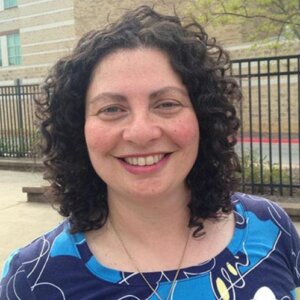Why I Tattooed My Arms Just in Time for Rosh Hashanah

Image by Courtesy of Ruth Abusch-Magder
The central themes of the High Holiday season — self-reflection, repentance and renewal — are hard to keep in mind for even three days, let alone ten. Try as I might, the days between Rosh Hashanah and Yom Kippur become much like the others, lost in a haze of carpool, deadlines and social obligations.
So this year, I’m doing something new. I am marking my arms with the Hebrew phrase, “Know before whom you stand.”
These words will be applied with henna and will fade as the season passes on. Living with a teen who has a talent for henna design, I have become accustomed to having intricate designs on my arm as she tries out new drawings. But I struggle with the idea of tattoos in general and writing words on my body is more concrete and tattoo-like than an abstract design. That this endeavor troubles me some will hopefully be part of its success. Writing in Hebrew on my forearms will be a sign that all is not as it should be, something radical is afoot, attention needs to be given.
The phrase was chosen with intention. It comes from the Talmud’s discussion of blessings. Fittingly for this time of year, Rabbi Eliezer, approaching death, was asked by his students what actions can ensure that we are worthy of the world to come. Among his answers, he explained that when praying we need to keep in mind before whom we stand. Humility in prayer has the potential to keep a check on our ego.
It is that awareness of the Divine that we as Jews are meant to keep front and center during the High Holiday season. Renewal and reward are possible if we take just this moment and consider our own fragility and that which is beyond our control. To have these words on my arms is to see them at all times, to be reminded that it is not just in the synagogue or at prayer that I stand before God, but everywhere. Humbling indeed.
But the accounting before God is by many measures easier than our accounting of both intentions and actions before our fellow human beings. Taken out of Talmudic context and placed on my arms, this phrase demands that I consider the flesh-and-blood people who stand before me, and their intrinsic holiness. Waking in the morning and washing up, perhaps these words will bring kindness to the smile lines and full cheeks of which I can be critical. Going about my business in the supermarket, I hope to be reminded each time I reach for an item that there are many, many people who make it possible for me to feed myself. And maybe even when I am stuck in traffic, the words will remind me that I sit among others who are just as worthy of reaching their destinations.

Image by Courtesy of Ruth Abusch-Magder
I am hopeful that this radical action will break the miasma of everyday life, but I’m not filled with illusions. In the heat of the Georgia fall, there will be no hiding from these words, and however prominent and jarring they might seem I assume I will get used to them or even forget to see them altogether.
In “Between God and Man,” Rabbi Abraham Joshua Heschel tellingly writes, “Know before whom you stand. Such knowledge, such understanding, is not easily won… The art of awareness of God, the art of sensing His Presence in our daily lives, cannot be learned off-hand.”
Awareness, built literally off my hands, will not be a cure but a gentle reminder helping me to build the deeper understanding I seek.
Rabbi Ruth Abusch-Magder, PhD, is an award-winning educator and parenting coach. She is a Rabbi Without Borders Fellow and works for Be’chol Lashon.

I hope you appreciated this article. Before you go, I’d like to ask you to please support the Forward’s award-winning journalism this Passover.
In this age of misinformation, our work is needed like never before. We report on the news that matters most to American Jews, driven by truth, not ideology.
At a time when newsrooms are closing or cutting back, the Forward has removed its paywall. That means for the first time in our 126-year history, Forward journalism is free to everyone, everywhere. With an ongoing war, rising antisemitism, and a flood of disinformation that may affect the upcoming election, we believe that free and open access to Jewish journalism is imperative.
Readers like you make it all possible. Right now, we’re in the middle of our Passover Pledge Drive and we need 500 people to step up and make a gift to sustain our trustworthy, independent journalism.
Make a gift of any size and become a Forward member today. You’ll support our mission to tell the American Jewish story fully and fairly.
— Rachel Fishman Feddersen, Publisher and CEO
Join our mission to tell the Jewish story fully and fairly.
Our Goal: 500 gifts during our Passover Pledge Drive!
























